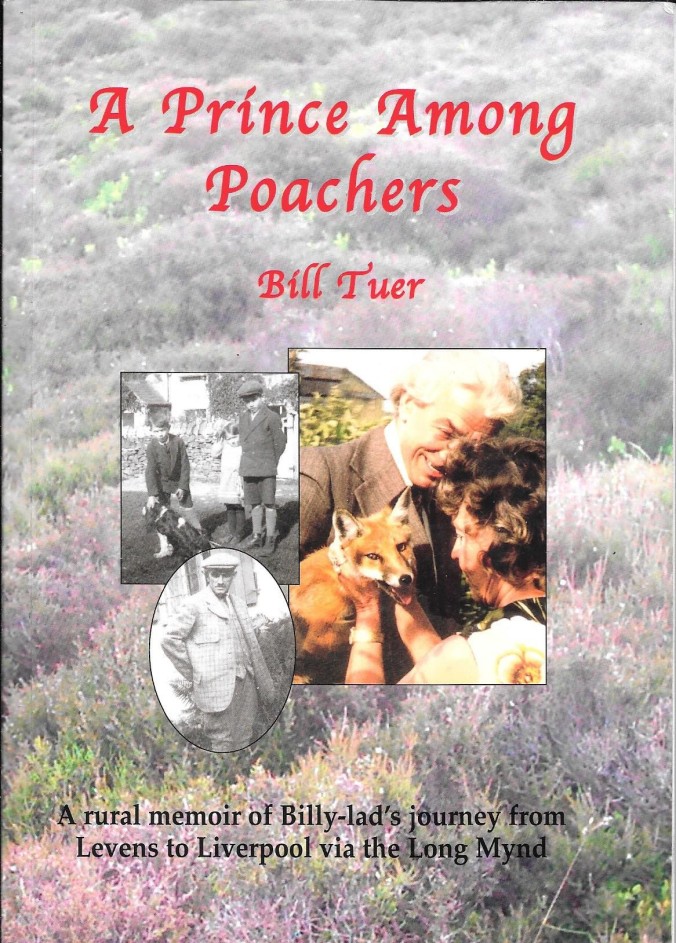
A Prince Amongst Poachers – Bill Tuer – C C Publishing (Chester) 2004
Despite wracking my brains I have been unable to think of a book that I have read which I found such hard going. Not because it was heavy, or traumatic, or anything; after all I have read some quite turgid “classics” and some exceedingly dry educational texts. No this was hard going because it was all over the place.
Starting with the title. You would expect, not unreasonably, that it would be full of tales about clandestine hunting, getting one over on the rural powers that be and narrow escapes, but there is scarcely any poaching in it. There is a little bit of trout tickling and some stealing of breeding pheasants from a rival estate, but mostly the book describes the activities of a gamekeeper’s son centred around raising birds for the wealthy to slaughter for fun, which is pretty much the opposite of poaching. Still I suppose Prince of Poachers has a more poetic and better alliterative ring to it than Toady to the Toffs.
If I’m being unfair and the author was an ace poacher who chose not to write about his less than legal activities, then fair enough, but if that is the case – then call your book something else!!
The opening chapter talks about the shit-house at the end of the garden and the Romans building Stonehenge. Having read it three times I was still none the wiser as to what the author was trying to say. My best guess is that he was trying to indicate that he learned more from listening and watching his old dad than anywhere else. But that doesn’t actually seem to be borne out by the book, where he talks mostly about learning from the village blacksmith. Whatever the case, the opening chapter sets the tone for the rest of the book which is beset by non-sequiturs, pet phrases and part stories. An example of the latter is where he talks about his father making a driptorch to burn heather. He doesn’t say why, and I assume that the heather regrowth was either food or better cover for the grouse. He then says he “put one together in a hurry to remove some gentleman who had been causing some trouble in a cornfield in Belgium.” This was presumably a wartime event, but we are left to wonder why it was necessary to burn down a cornfield.
The book’s digressions and conversational style made me initially think it was a book made from transcripts of recorded conversations. But I’m not sure it is, even though the thirty-seven (!) short chapters do come across as a collection of anecdotes.
About two thirds of the way through it shifts away from the land to WW2. This is certainly the best written section if the book, which isn’t saying much, and more interesting because it is slightly more factual.
It is not a book entirely without merit, I laughed out loud at the tale of dropping a live chicken down the school mistress’s chimney, and was genuinely moved by the sad tale of how, aged 10, young “Billy- Lad” had to put down his lifelong pet dog. And though it was of no interest to me, royal biographers would doubtless get over-excited at the involvement of a twenty-something Edward VIII in pinching the pheasants.
There are a couple of interesting people mentioned in the text who I was not previously aware of. Firstly, the uniquely named Dr Buck Ruckston, a murderer who the author claims to have caught after serving him with petrol. This doesn’t tally with the reported facts of the case , but the court record does refer to petrol being purchased.
The second person is really fascinating, despite, or perhaps because of, only being mentioned in six short lines. It really is a shame there isn’t more on him. Max Wenner is described as a German who fell, or was pushed, out of a plane over the Channel and owned of a gun the shape and size of a fountain pen. Quite how you can touch on such an interesting individual and not elaborate I don’t know. But then perhaps the author did not know more.
The author comes across as an inventive and practical man, and perhaps an amusing raconteur, but alas that does not translate into making this book a very engaging or amusing read. This is a great shame, as with a co-writer, I don’t doubt a half-decent memoire of the early 20th century English countryside could have been created.
Pingback: The Max Wenner Mystery | Rare Earth